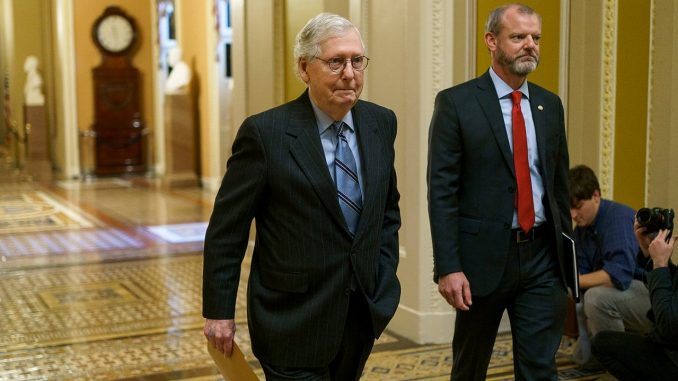
Senate Republicans voted Wednesday to elect Sen. Mitch McConnell (R-Ky.) as their leader over National Republican Senatorial Committee Chairman Rick Scott (R-Fla.), who announced his desire to replace McConnell at an acrimonious conference meeting Tuesday.
A large majority of GOP senators voted to elect McConnell leader after a motion backed by Sen. Ted Cruz (R-Texas) and other conservatives to delay the leadership election until after the Dec. 6 Georgia Senate runoff failed.
McConnell received 37 votes while Scott received 10 votes. One senator voted present.
“We collectively, I think, had a good discussion about what happened in the election and what happens in the next election,” McConnell said after a more than three-hour meeting of the Senate Republican Conference in the Old Senate Chamber. “I’m grateful for the opportunity to continue to serve.”
Scott’s last-minute challenge to McConnell represented the toughest competition the senior Republican senator has faced for the top leadership job since he became Senate minority leader in 2007.
Sen. Tom Cotton (R-Ark.) and Senate Republican Conference Chairman John Barrasso (Wyo.) nominated McConnell to serve another two years as GOP leader.
Sen. Ron Johnson (R-Wis.), who just won a tough reelection race, nominated Scott.
McConnell wound up winning by a comfortable margin, retaining the support of many GOP colleagues after he helped raise more than $300 million to help Republicans win back the Senate majority this election cycle.
Two outside groups affiliated with McConnell, the Senate Leadership Fund and One Nation, spent $363 million on Senate races, according to a person familiar with their fundraising record, significantly more than what Scott raised as head of Senate Republicans’ campaign arm.
Scott and other Senate Republican critics of McConnell’s leadership style, however, argued that the Kentucky senator failed to give voters a clear picture of what the Republican governing agenda would be if the party won control of the Senate.
In a letter to colleagues circulated Tuesday, Scott promised to “lead the conference in developing a positive, aspirational agenda that outlines our legislative goals and what Senate Republicans stand for.”
Scott in a statement after the election vowed to continue fighting for bold conservative leadership in the Senate.
“Although the results of today’s elections weren’t what we hoped for, this is far from the end of our fight to make Washington work,” he said.
He sought to shift the spotlight onto his differences with Democrats instead of with his own Republican leadership.
“I will never stop fighting to end Joe Biden’s reckless government spending and the devastating inflation Democrats have caused,” he declared.
McConnell on Tuesday rejected Scott’s criticism that his decision not to put out an agenda before Election Day hurt GOP candidates.
“Every one of our candidates knew what they were for, expressed it quite clearly. It’s pretty obvious, and all of you have been writing about it, what happened. We underperformed among independents and moderates because their impression of many of the people in our party in leadership roles is that they’re involved in chaos, negativity, excessive attacks, and it frightened independent and moderate Republican voters,” he said, in what appeared to be a reference to former President Trump’s political tactics.
He said he saw the unfolding political dynamic weeks before Election Day, which turned out to be a major disappointment for many Senate Republicans who hoped to return to the majority next year.
“We saw that, which is why you all recall I never predicted a red wave,” he told reporters Tuesday. “There was no wave.”
McConnell said that Republicans were “crushed by independent voters” in Arizona and New Hampshire.
“We learned some lessons about this and I think the lesson is pretty clear: Senate races are different. Candidate quality — you recall I said in August — is important,” he said.
He also reiterated that he felt confident he would have enough votes to beat Scott, a Trump ally.
Sen. Mike Braun (R-Ind.), who announced his support for Scott’s leadership bid, said that McConnell has been too focused on playing defense against Democrats.
“I’m going to support whatever changes the current dynamic,” Braun said before the meeting. “I want to feel like I’m part of the process. I want to make sure that we’re getting policy out there that we can all discuss and have input on.
“We need to have a blueprint for the country, we need to have a plan and we need to have a process that keeps us all engaged as senators,” he said.
McConnell maintained the support of the top members of his leadership team, Senate Republican Whip John Thune (S.D.) and Barrasso, who themselves have significant influence among GOP colleagues.
Thune and Barrasso won reelection to serve new terms as the second- and third-ranking leaders by acclimation, according to a Senate GOP aide.
Sen. Joni Ernst (R-Iowa) was elected to replace the retiring Sen. Roy Blunt (R-Mo.) as head of the Senate Republican Policy Committee.
Sen. Steve Daines (R-Mont.) was elected to serve as the next chairman of the National Republican Senatorial Committee.
Sen. Shelley Moore Capito (R-W.Va.) was elected to replace Ernst as vice chairwoman of the Senate GOP conference.
Via The Hill
